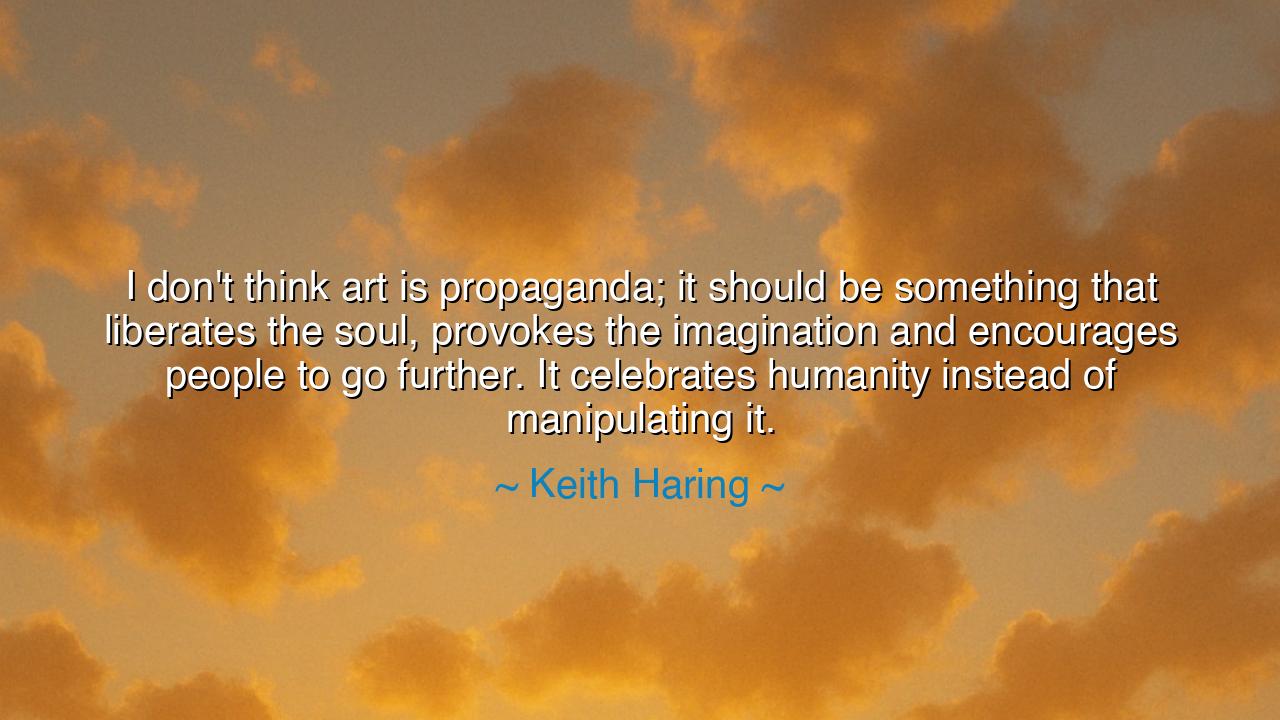
I don't think art is propaganda; it should be something that
I don't think art is propaganda; it should be something that liberates the soul, provokes the imagination and encourages people to go further. It celebrates humanity instead of manipulating it.






Opening Scene
The soft glow of the evening light fills the room, casting long shadows across the walls. Jack and Jeeny sit at the kitchen table, their mugs of tea resting gently between them. The quiet of the outside world is softened by the stillness inside, creating a peaceful atmosphere. The flickering candlelight adds a subtle rhythm to their conversation, which has turned toward something reflective and inspirational.
Host: The calm in the room feels almost deliberate, as if they are about to delve into something deeper. Jeeny looks up from her tea, her expression thoughtful, before she shares a quote that has been on her mind.
Jeeny: (softly, her voice reflective) “I came across something by Keith Haring recently that really struck me. He said, ‘I don’t think art is propaganda; it should be something that liberates the soul, provokes the imagination and encourages people to go further. It celebrates humanity instead of manipulating it.’ Isn’t that a powerful way to think about art? The idea that art should liberate us, not control us?”
Jack: (nodding slowly, his voice thoughtful) “It really is. Haring’s words challenge the common perception of art as a tool to push a certain agenda or ideology. He’s saying that art should be freeing, a way to explore new ideas, to expand our minds, to celebrate our humanity rather than restrict it. Art, at its core, should inspire, not manipulate.”
Jeeny: (smiling softly, her voice gentle) “Exactly. So often, art is used to promote a message or sell an idea, but Haring is saying that art’s true purpose is to free the soul and to spark imagination. When art does that, when it encourages us to think, to question, to dream — that’s when it’s most powerful. It’s about pushing boundaries, expanding possibilities, and celebrating who we are as people, without trying to control or limit our thinking.”
Host: The quiet in the room deepens, as though Haring’s perspective has opened a new layer of thought between them. The flickering candlelight adds a rhythm to their words, casting soft shadows across the room. Jack takes a slow sip of his tea, clearly reflecting on the deeper meaning behind Haring’s view of art.
Jack: (his voice gentler, almost contemplative) “It’s humbling, isn’t it? To think that art can be a force for liberation rather than manipulation. We often think of art as something to be interpreted, something that conveys meaning or promotes a certain worldview. But Haring’s approach challenges us to see it as something that should liberate us from conventionality, something that sparks our creativity and encourages us to go beyond what’s familiar.”
Jeeny: (nodding, her voice reassuring) “Yes, exactly. Art that liberates the soul doesn’t force a message on you — it opens up space for exploration. It doesn’t dictate; it invites you to think freely, to connect with your own humanity. It’s a way to look at the world, to challenge the way we see things, and to find beauty in the diversity of human experience.”
Host: The warmth in the room seems to grow as they sit together, processing the idea that art’s true value lies not in what it tells us, but in what it allows us to discover for ourselves. The world outside may continue, but inside, the realization that art should be freeing, expansive, and human-centered has settled between them.
Jack: (smiling slightly, his voice reflective) “I think what Haring’s perspective teaches us is that art isn’t about having an agenda. It’s about creating something that invites people to experience emotion, to feel connected to something larger than themselves. It’s about celebrating humanity, not manipulating it. Art, at its best, helps us discover our shared experience, rather than telling us how to see it.”
Jeeny: (smiling warmly, her voice affirming) “Exactly. When we see art as a celebration of humanity, we can appreciate it for what it truly is — a reflection of our world, of our feelings, our stories, our struggles. It’s not about persuading or directing; it’s about creating space for people to connect, to think, and to be inspired.”
Host: The quiet between them feels peaceful now, filled with the understanding that art’s power comes not from how it instructs us, but from how it inspires us. Jack and Jeeny sit in the realization that the best art is the kind that frees us — that pushes us to think differently, to celebrate the human experience, and to engage with the world in a way that promotes understanding and growth.
Jack: (with a thoughtful smile, his voice calmer) “I think that’s what makes art so universal. It’s not about imposing a message on others, but about creating something that resonates, that invites connection and understanding. That’s where the power lies.”
Jeeny: (nodding, her voice gentle) “Exactly. When art is truly liberating, it transcends boundaries, challenges our assumptions, and opens up a space where we can all connect, think, and grow together. That’s the beauty of it.”
Host: The evening continues, but the room feels richer now, filled with the quiet realization that the value of art lies in its ability to inspire and liberate. Jack and Jeeny sit in the understanding that the most meaningful art is the kind that celebrates humanity, that encourages us to question and connect, and that invites us to expand our understanding of the world. The world outside continues, but inside, they are reminded that art is not just something we look at; it’s something we experience, and through that experience, we are given the freedom to think, feel, and grow.






AAdministratorAdministrator
Welcome, honored guests. Please leave a comment, we will respond soon